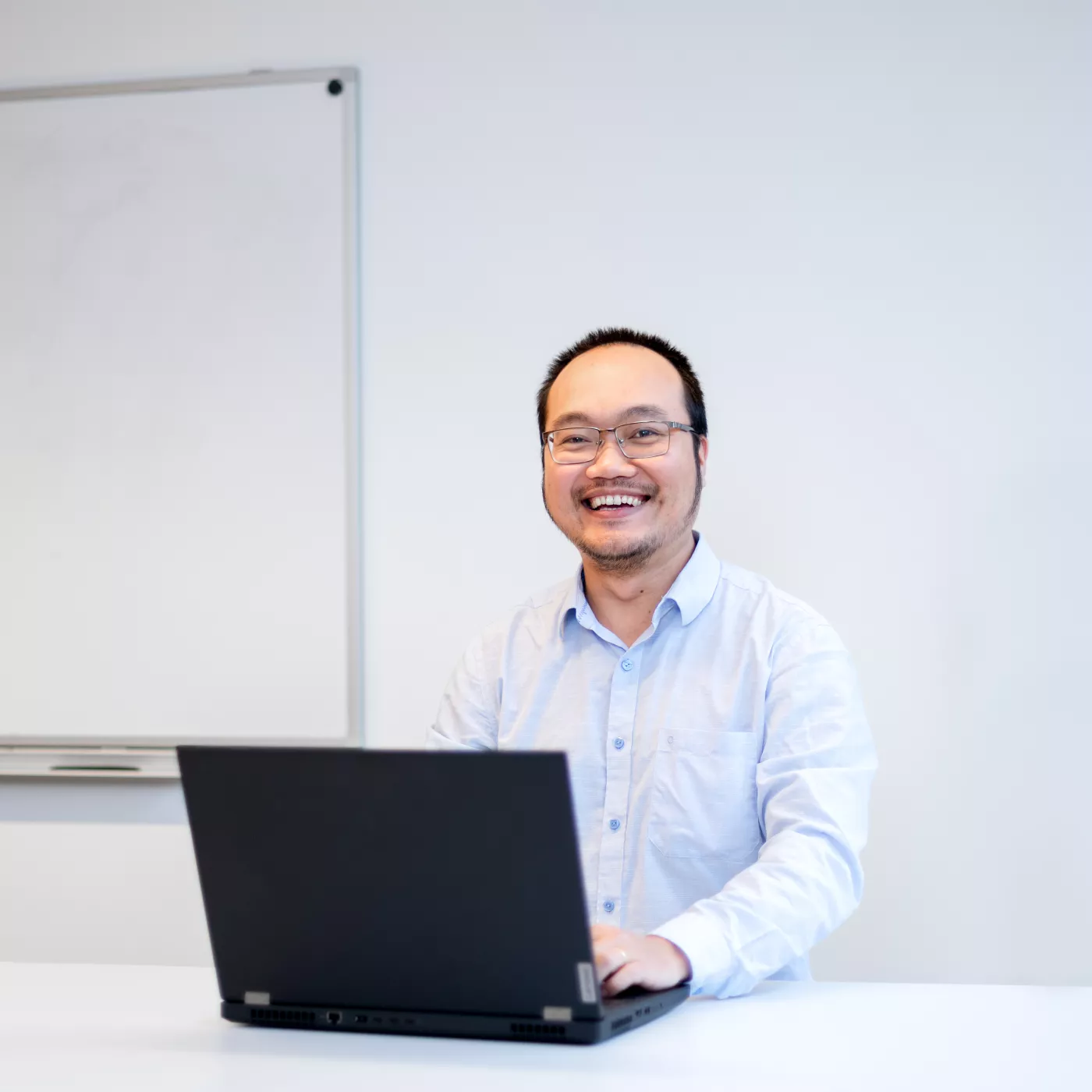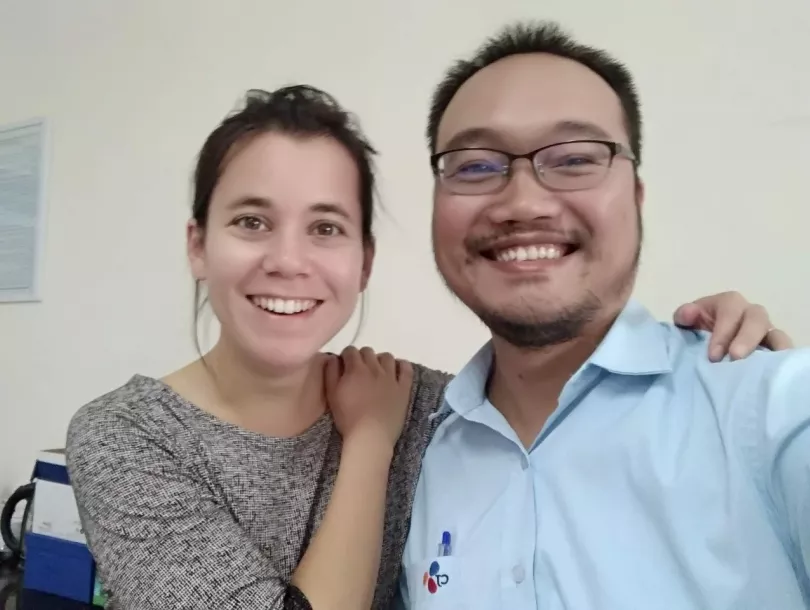Fighting climate change in Vietnam through sustainable partnerships

When Thi Van Le Khoa (Khoa) finished his bachelor’s degree, he did not expect to become a lecturer one day. Now, ten years later, Khoa has a leading role in the Orange Knowledge Programme’s Climate Proof Vietnam. As a young lecturer at Hanoi University of Natural Resources & Environment (HUNRE) he works closely with Lindsey Schwidder, the project lead at Dutch partner TU Delft. They have now worked with each other for as much as ten years. In this interview they tell us about their collaboration and achievements so far.
It is Khoa’s mission to help improve the water sector in his home country, and it didn’t come out of nowhere. Vietnam is getting hit very hard by climate change. The Red River delta and Mekong delta are beautiful, but they cause many challenges related to water. To put it simply, Vietnam’s water challenges are: too much, too little and too dirty water. Climate Proof Vietnam is an institutional collaboration project under the Orange Knowledge Programme, a programme funded by the Ministry of Foreign Affairs and managed by Nuffic. It aims to solve Vietnam’s water challenges and it is a collaboration between TU Delft, Hanoi University of Natural Resources & Environment (HUNRE), Thuyloi University, and the Faculty of Geo-Information Science and Earth Observation (ITC) of the University of Twente.
Strong partnerships with a long-term vision
“Positive change is not created overnight,” says Lindsey. “To create lasting impact you need to invest in long-term and sustainable partnerships.” The programme started in 2019, but the partnership between Dutch and Vietnamese universities already exists for over 25 years. With each programme and joint initiative, the partnership grows stronger and more effective over the years.

Developing partnerships in a changing world
It is clear that HUNRE developed a solid water management curriculum. “Some of the TU Delft teachers even say that the curriculum in Vietnam is built more logically than in The Netherlands!” Lindsey says. “Now our partnership developed into a more strategic collaboration to strengthen HUNRE as an organisation. This is also clearly evident in how the Orange Knowledge Programme directly builds on its predecessor, the NICHE programme. Under NICHE, the TU Delft set up a Master’s degree together with Thuyloi and now, under the Orange Knowledge Programme, many of those same Master students are using their knowledge to improve HUNRE’s curriculum and organisation. Khoa’s story beautifully shows how seeds planted in the NICHE programme grew to become important factors in making the current Orange Knowledge Programme a success.
“I got involved as a young graduate after I finished my bachelor degree,” Khoa says. “My journey with TU Delft started under the Orange Knowledge Programme’s predecessor, the NICHE programme. I studied a Master’s degree that was set up by TU Delft at Thuyloi University under the NICHE programme. Then I spent 1,5 years in The Netherlands doing research at TU Delft. I can now apply this knowledge as one of the younger lecturers at HUNRE. And my experiences help me in my work to support the Climate Proof Vietnam programme locally and ensure it becomes institutionally embedded in my university.”
Khoa’s story is not unique. More young students followed the same path and now work with partners to strengthen and modernise the Integrated Water Resources Management (IWRM) curriculum at HUNRE. They are living proof that investing in institutional collaboration brings forth a younger generation of brilliant and impactful changemakers.
Lindsey adds: “It is important to us that we build long-term partnerships and I would recommend that to every university or organisation working together with international partners. Because we worked together in other programmes before, we could quickly realise our goals when the Climate Proof Vietnam started. We now work super efficiently, because the people involved already know each other so well. We really trust each other and work as a team, but it takes years to build that trust.”
Sustainable impact for the coming decades
So far, the results of the programme are very promising. Since the start in 2019, 180 students have already graduated from the curriculum and the number of applicants increases every year. HUNRE is quickly becoming the ideal environment to train the next generation of water engineers who will help protect Vietnam against water.
“The Orange Knowledge Programme really gives us a boost. We have access to the resources and knowledge that we need to grow as an organisation,” says Khoa. “Our close connection to TU Delft helps to improve the curriculum and the organisation in so many ways. In the first phase Dutch water management professors helped to strengthen the content of our courses and made it more practical and relevant. We also improved the capacity of the staff with training from Dutch experts. Our teachers are now more skilled in training their students to think critically and independently, in giving and receiving feedback and using the right technologies and software. In addition, the programme gives us the right tools and knowledge to also improve the infrastructure of our organisation. For example, we now use open-source technologies like Python, so that all course materials are freely accessible for everyone. And during the pandemic we worked together with TU Delft to set up a strong online learning environment. We will forever use these new approaches and mindset, even if the programme ends. And more importantly, our staff and students will take this knowledge with them wherever they go: this way, the programme reaches even beyond HUNRE and brings positive change to the entire water sector in Vietnam.”
To Lindsey, this proactive attitude from the Vietnam partners is why the programme is such a success. “It is great to see that they really take ownership. It’s not like we as TU Delft tell them what to do. No, they really take the initiative to tell us what challenges arise, which ones are a priority and how they want to approach this. We then really work together to figure out the best way to solve those challenges, and for instance connect them to the right experts. Without the Orange Knowledge Programme, we wouldn’t be able to invest the time, network or even share practical equipment that is needed to contribute to solving those challenges.”
What also helps is that all partners benefit from this partnership in their own way. “It is very valuable that our students and researchers can work and study in Vietnam”, says Lindsey. “Sure, we have our rivers and our delta but it’s nothing compared to the delta’s in Vietnam. It requires different competencies to create impact there and it especially asks for more flexibility and creativity from our side.”
“I think TU Delft also benefits a lot in terms of research. Besides this programme we also have a joint venture (VINWATER) with Thuyloi University to do research projects together. This way we learn together, and we also build TU Delft’s reputation and the reputation of our partners. For instance, recently the World Bank asked us to help them in giving training courses in Vietnam because they know we have such a strong partnership,” Lindsey says.
For instance, during the pandemic we set up a good online learning environment. And currentlywe are also working together on their marketing strategy to attract the younger generation and spark their interest in working in the water sector, to help Vietnam become climate proof in the future”.
Recently a new challenge appeared: young people in Vietnam are more interested in business studies than in engineering studies. HUNRE has a more difficult time attracting students.
“Suddenly the applications decreased,” Khoa says. “So we do many things to attract students. We hired a marketing company to teach lecturers how to advertise themselves, and create attractive promotional materials like flyers. We take our Dutch colleagues to school classrooms to connect with young students, and we even showed our commercials on television! I’m happy that we now see an increase in applications every year.”
Besides attracting students, they also focus on how to prepare those students for the labour market. Before the start of the programme, there was a gap between what students learned in school and what was needed in ‘the real world’.
“We really thought about how we can make the curriculum more practical. We now have the right research equipment and we organise field trips, so that students learn how to apply their knowledge in the field. But the most important thing is that we now have a Community of Practice (CoP) to involve the private sector and ministries. Companies present their challenges in class via guest lectures and students work on real-life case studies to enhance their knowledge. They also do internships so that they know what to expect when they start working,” says Khoa. He laughs and says that students from HUNRE are among the most confident and direct students in Vietnam (perhaps inspired by the Dutch directness ;)).
A new generation of water engineers is on the rise at HUNRE, with the help of the programme. Some will become lecturers like Khoa and some will work directly in the field, but all of them greatly impact Vietnams’ water sector. Khoa and Lindsey plan to work on their mission together, for many years to come.
